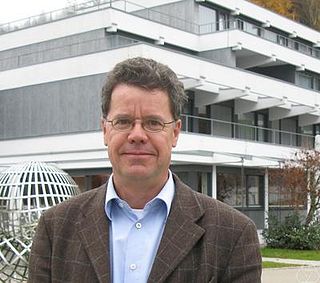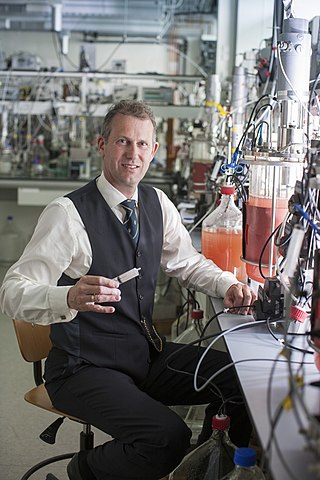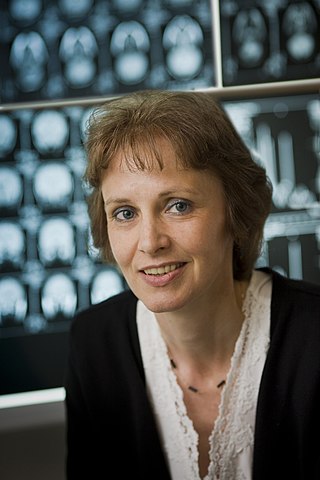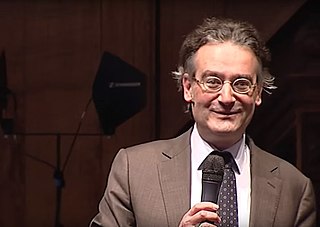
Robertus Henricus "Robbert" Dijkgraaf FRSE is a Dutch theoretical physicist, mathematician and string theorist, and the current Minister of Education, Culture and Science in the Netherlands. From July 2012 until his inauguration as minister in January 2022, he had been the director and Leon Levy professor at the Institute for Advanced Study in Princeton, New Jersey, and a tenured professor at the University of Amsterdam.

Hartmut Michel is a German biochemist, who received the 1988 Nobel Prize in Chemistry for determination of the first crystal structure of an integral membrane protein, a membrane-bound complex of proteins and co-factors that is essential to photosynthesis.

The Spinoza Prize is an annual award of 2.5 million euro, to be spent on new research given by the Dutch Research Council (NWO). The award is the highest scientific award in the Netherlands. It is named after the philosopher Baruch de Spinoza.

Izak (Ieke) Moerdijk is a Dutch mathematician, currently working at Utrecht University, who in 2012 won the Spinoza prize.

Albert J.R. Heck is a Dutch scientist and professor at Utrecht University, the Netherlands in the field of mass spectrometry and proteomics. He is known for his work on technologies to study proteins in their natural environment, with the aim to understand their biological function. Albert Heck was awarded the Spinoza Prize in 2017, the highest scientific award in the Netherlands.
The Bijvoet Centre for Biomolecular Research is a research institute at Utrecht University. The Bijvoet Centre performs research on the relation between the structure and function of biomolecules, including proteins and lipids, which play a role in biological processes such as regulation, interaction and recognition. The Bijvoet Centre houses advanced infrastructures for the analysis of proteins and other biomolecules using NMR, X-ray crystallography, electron microscopy and mass spectrometry. The institute is named after famous Dutch chemist Johannes Martin Bijvoet, who worked at Utrecht University.

Birgit Meyer is a German professor of religious studies at Utrecht University.

Mike Jetten is a Dutch professor of Microbiology at the Radboud University Nijmegen. He was a winner of the 2012 Spinoza Prize.

Marten Scheffer is a Dutch ecologist, mathematical biologist and professor of Aquatic Ecology and Water Quality Management at Wageningen University and Research Centre. He was a winner of the 2009 Spinoza Prize. His research focuses on complex systems and their adaptability.

Anna Sergeevna Akhmanova is a Russian-born professor of Cell Biology at Utrecht University in the Netherlands. She is best known for her research regarding microtubules and the proteins, called TIPs, that stabilize one specific end of the tubules. Among the awards she has won, she was one of the recipients of the 2018 Spinoza Prize, the highest honor for Dutch scientists.

Marjo S. van der Knaap is a Dutch professor of pediatric neurology at VU University Amsterdam and the VU University Medical Center. She was a winner of the 2008 Spinoza Prize. Her research focuses on white matter disorders.

Theodorus "Theo" Henricus Maria Rasing is a Dutch professor of experimental physics at Radboud University Nijmegen. His expertise lies in the field of magneto-optics. He was a winner of the 2008 Spinoza Prize.

Balthassar Jozef Paul "Bas" van Bavel is a Dutch historian. He has held the chair of Transitions of Economy and Society at Utrecht University since 2011, and has been professor of Economic and Social History since 2007. His research has mostly focused on pre-industrial Northwestern Europe. He was one of the winners of the 2019 Spinoza Prize, the highest award in Dutch science.
Marc Baldus is a physicist and professor of NMR spectroscopy at Utrecht University. He is especially known for his work in the field of structural biology using solid-state nuclear magnetic resonance (ssNMR) spectroscopy. He applies ssNMR methods to establish structure-function relationships in complex biomolecular systems including membrane and Amyloid proteins. In addition, he develops cellular NMR methods to study large molecular transport and insertion systems in bacteria as well as signal transduction mechanisms in eukaryotic cells.

Marileen Dogterom is a Dutch biophysicist and professor at the Kavli Institute of Nanoscience at Delft University of Technology. She published in Science, Cell, and Nature and is notable for her research of the cell cytoskeleton. For this research, she was awarded the 2018 Spinoza Prize.
Jan Cornelis Maria van Hest is a Dutch scientist of organic chemistry, best known for his research regarding polymersomes and nanoreactors. He currently holds the position of professor of bioorganic chemistry at Eindhoven University of Technology and is scientific director at the Institute of Complex Molecular Systems. Among the awards he has received, he was one of the recipients of the 2020 Spinoza Prize.

Casper Hoogenraad is a Dutch Cell Biologist who specializes in molecular neuroscience. The focus of his research is the basic molecular and cellular mechanisms that regulate the development and function of the brain. As of January 2020, he serves as Vice President of Neuroscience at Genentech Research and Early Development.

Beatrice A. de Graaf is a Dutch history professor at the Faculty of Humanities at Utrecht University. Her areas of expertise are terrorism, international relations & security and the modern history of Europe.

Jan Hendrik Jozef Hoeijmakers is a Dutch molecular biologist, biochemist, and molecular geneticist.
Reuven Agami is a Dutch cancer researcher. He is a professor of Oncogenomics at Erasmus University Rotterdam and head of the section of Oncogenomics at the Netherlands Cancer Institute-Antoni van Leeuwenhoekziekenhuis.
















